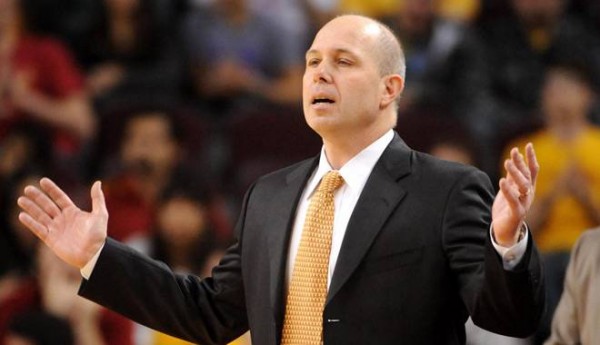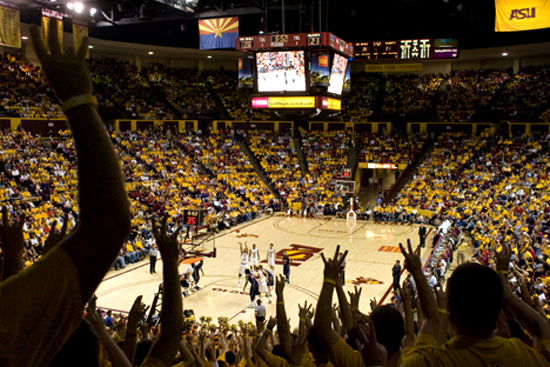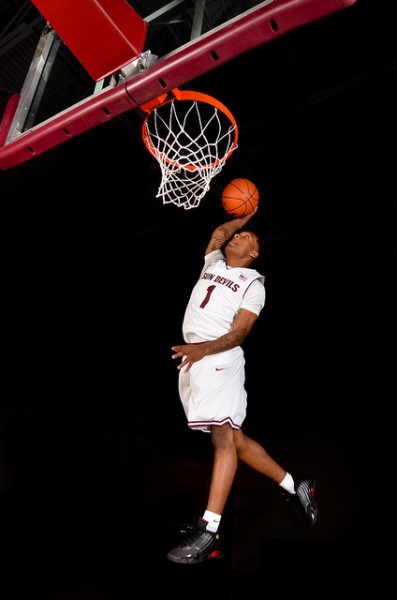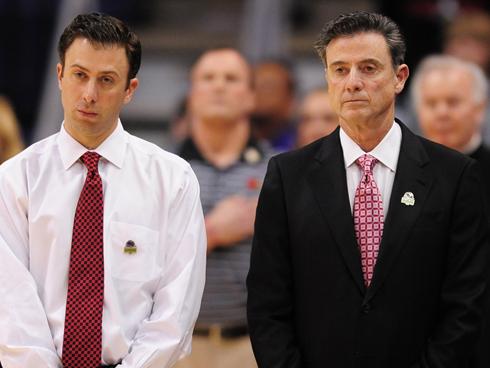Posted by AMurawa on June 14th, 2012
When Herb Sendek left North Carolina State after the 2005-06 season to move to Arizona State, he had the reputation of a coach who had gotten the most out of his players. And after three-straight 20-win seasons in at ASU, two years ago he looked like he was going to be a fixture in Tempe for the foreseeable future. But last year, after a second consecutive dismal season and with players transferring out of the program at a rapid rate, there were some in the Sun Devil community calling for his head. Is Sendek still the right man for the ASU job and how important is the 2012-13 season for his future in Tempe?
Andrew Murawa: While the last two seasons have been undeniably disappointing and the epidemic of transfers certainly could be interpreted as something rotten at the heart of the program, Sendek has earned the benefit of the doubt in Tempe. Unfortunately, of the four losing seasons in his 19-year career, three have come at ASU, including the last two. Still, there are those three other 20-win seasons and three postseason appearances, only two of which came with the third pick in the 2009 NBA Draft, James Harden. And, while the 2010-11 failure remains somewhat inexplicable, last year’s struggles can in part be chalked up to some bad luck. The bad luck excuse doesn’t get you far, however, and another season as gloomy as the last two will have the buzzards circling even with the two-year extension that Sendek signed last December that will ostensibly keep him around through 2016. But, the good news is that Sendek has proven over the long haul that he can coach. And, in a state like Arizona that doesn’t produce a large number of great major conference-caliber prospects, his ability to coach his players up is a must. This year should begin to see the return of the ASU program, with Jahii Carson supplying an answer at point, and with guys like Evan Gordon, Carrick Felix and Jordan Bachynski reaping the benefit of a playmaking guard. While the Sun Devils certainly shouldn’t be expected to compete for a conference title, it is hard to envision this roster not showing significant improvement.

In 19 Seasons As A Head Coach, Sendek Has Had Four Losing Seasons, But Three Have Come In Tempe (Kirby Lee, US Presswire)
Connor Pelton: I see 2012-13 as a make or break year for Sendek. We don’t have to see any magical “10 wins one season, 22 and an NCAA Tournament appearance” the next, but improvement and roster stability is a must. Even with the losses of three key contributors plus a role player since January, the troops have arrived in Tempe and the pieces are in place for at least an NIT berth next season. While it will take a while to replace the productivity of Trent Lockett, highly-touted guard Jahii Carson is going to do his best to speed up that process. If he plays anywhere near the potential we’ve been hearing about, he will be one of the best freshman guards in the Pac-12. Replacing arguably the Pac-12’s most improved player through two and a half months last season will be ambitious as well, but freshman Calaen Robinson could very will fill the hole left by Keala King. Growing up 20 minutes away from Tempe, Robinson decided to keep his talents in the Valley of the Sun. The decision could prove to be huge for ASU has Robinson will be more fit to handle the true point guard duties. Filling the holes will be one thing, but equally important will be building and keeping relationships with the entire roster. Numerous players were in Sendek’s doghouse throughout last year, which would lead to the eventual dismissal of King. If Sendek can avoid any more roster shakeup and post a winning record, his job should be safe.
| microsites, pac 12
| Tagged: arizona state, calaen robinson, carrick felix, evan gordon, herb sendek, hot seat, jahii carson, james harden, jordan bachynski, keala king, pac-12, trent lockett
Share this story


















































